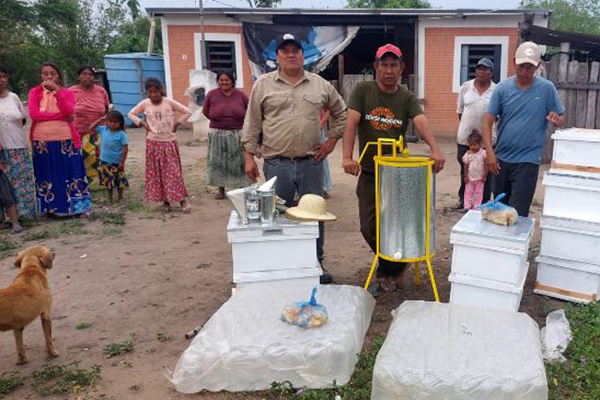
Top: Leonardo (left) with honey he poduced, Middle and Bottom; distribution of beekeeping technologies in Leonardo’s community
In his rural town in the Lower Chaco region of Paraguay, Leonardo Martinez and his family rely on basic activities like washing their hands, having a clean home, cultivating crops and selling their produce in local markets to survive. These activities may sound simple, but as access to water in this region of Paraguay becomes increasingly scarce, life in rural towns like the one Leonardo lives in has felt impossible.
At the beginning of 2022, a heat wave in Paraguay hindered agricultural production and burned crops that had been ready to harvest. Most of the communities we partner with were only able to harvest less than a third of what they expected. “Last year there was little rain. The weather changes a lot; everything is dry, absolutely dry,” said Leonardo, who is an agricultural leader in El Espinillo. He said, “there is no way to grow multiple things, just some plants and oranges.”
With the help of our local partners, we are working to give families like Leonardo’s their right to water back. We are doing this by repairing drinking water infrastructure, digging wells and installing water-collecting roofs. Leonardo is just one of the 196 families participating in this program. He told us, “now we have access to drinking water, thanks to your help.”
We are also introducing communities to sustainable livelihoods such as beekeeping and caring for livestock. In October 2022 alone, we delivered 100 goats to the 10 towns in the program. We also registered 122 new producers of honey and estimated that each individual produced about 16 gallons of honey last year. Leonardo commented, “today there are even more hives loaded with honey.”
As these rural towns move forward, their residents are advancing with them. Participants in these towns were invited to attend classes on literacy and indigenous education laws and were trained on how to make water drinkable and the consequences of consuming contaminated water. Around 360 families attended these education sessions. Other larger initiatives have also emerged to address these challenges.
Finally, our team and partners are working to address a major, overarching issue at play here: climate change. We’re focused on uniting communities, local government authorities, human rights organizations and other involved groups to understand the impact that climate change is having locally and try to mitigate its harmful effects. Through this inititative, we’ve helped launch three important events and institutions in the local department (similar to a U.S. state) of President Hayes: the first Interinstitutional Conversation of the Bajo Chaco on Climate Change; the Department Technical Board on Climate Change; and the Departmental Summit on Climate Change.
While we can’t control the weather, we can still take action to ensure everyone has the right to live stable and healthy lives. Through their resilience and commitment, the communities of the Paraguayan Gran Chaco have a newfound strength and are looking forward to growing more in the new year.
This story is part of the Integral Rural Development project, led by our local partner, Pastoral Social Diocesana Benjamín Aceval, with the support of Growing Hope Globally.

